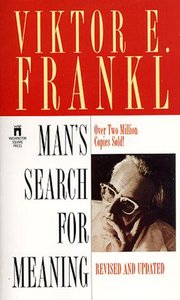Viktor Frankl
|
|
Viktor_Frankl.jpg
Viktor Emil Frankl, M.D., Ph.D., (March 26, 1905 - September 2, 1997) was a Vienna-born neurologist and psychiatrist. Frankl was the founder of logotherapy and Existential Analysis, the "Third Viennese School" of psychotherapy. His book Man's Search for Meaning (first published in 1946) chronicles his experiences as a concentration camp inmate and describes his psychotherapeutic method of finding a reason to live. He was one of the key figures in existential therapy.
| Contents |
Life before 1945
Frankl's interest for psychology surfaced early in his life. For the final exam (Matura) in high school he wrote a paper on the psychology of philosophical thinking. After he graduated from high school in 1923, he studied medicine at the University of Vienna and later specialized in neurology and psychiatry. From 1933 to 1937 he headed the so-called "Selbstmörderpavillon" (suicide pavillion) of the General Hospital in Vienna and from 1937 to 1940 he privately practiced psychiatry. From 1940 to 1942 he headed the neurological department of the Rothschild hospital (at this point of time this hospital was the only one left in Vienna where Jews were admitted).
In 1942 he married Tilly Grosser. In the same year he, his wife and his parents were deported to the concentration camp of Theresienstadt. In 1944 he was transported to Auschwitz and later to Kaufering and Türkheim, two concentration camps adjuncted to the KZ Dachau. He was liberated on April 27th 1945 by the US Army.
Frankl survived the Holocaust, but his wife, father and mother were murdered in concentration camps (of his immediate relatives only his sister, who had emigrated to Australia, survived the Holocaust). It was due to his (and others') suffering in these camps that he came to the conclusion that everybody needs a strong goal in life to overcome the worst tidal waves of faith. In addition his theses that even in the most absurd, painful and dehumanised situation life has meaning and therefore even suffering is meaningful served as a strong basis of Frankl's later creation of logotherapy.
Life after 1945
Liberated after 3 years of life in concentration camps he returned to Vienna. Already during 1945 he wrote his world famous book titled "Ein Psychologe erlebt das Konzentrationslager" (English title: Man's Search for Meaning), wherein he tried to objectively describe the life of an ordinary concentration camp inmate from the perspective of a psychiatrist. In 1946 he was appointed to run the Vienna Poliklinik of neurologics, where he worked until 1971.
In the post-war years Frankl published more than 30 books and is most notably known as the founder of logotherapy (logos greek word for sense). He gave guest lectures and seminars all over the world and received 29 honorary doctor degrees.
Frankl died September 2nd, 1997, in Vienna.
Miscellaneous
- He often said that even within the narrow boundaries of the concentration camps he got to know only two kinds of men: decent and non-decent ones.
- Frankl once recommended the Statue of Liberty be complemented by a Statue of Responsibility on the west coast.
Quote
- We must remain aware of the fact that as long as absolute truth is not accessible to us (and it never will be), relative truths have to function as mutual correctives. Approaching the one truth from various sides, sometimes even in opposite directions, we cannot attain it, but we may at least encircle it.
- "Ultimately, man should not ask what the meaning of his life is, but rather must recognize that it is he who is asked. In a word, each man is questioned by life; and he can only answer to life by answering for his own life; to life he can only respond by being responsible.
- We who lived in concentration camps can remember the men who walked through the huts comforting others, giving away their last piece of bread. They may have been few in number, but they offer sufficient proof that everything can be taken from a man but one thing: the last of the human freedoms -- to choose one's attitude in any given set of circumstances, to choose one's own way.
Bibliography
- Viktor E. Frankl; Man's Search for Meaning; Washington Square Press; ISBN 0-67102-3373 (Softcover, December 1997)
See also
External links
- Biography at Vienna University (http://logotherapy.univie.ac.at/e/lifeandwork.html)
- Biography at Shippensburg University (http://www.ship.edu/~cgboeree/frankl.html)
- Few quotes from Viktor Frankl (http://www.tamilnation.org/sathyam/west/frankl.htm)de:Viktor Frankl
es:Viktor Frankl he:ויקטור פראנקל ja:ヴィクトール・フランクル fi:Viktor Frankl

